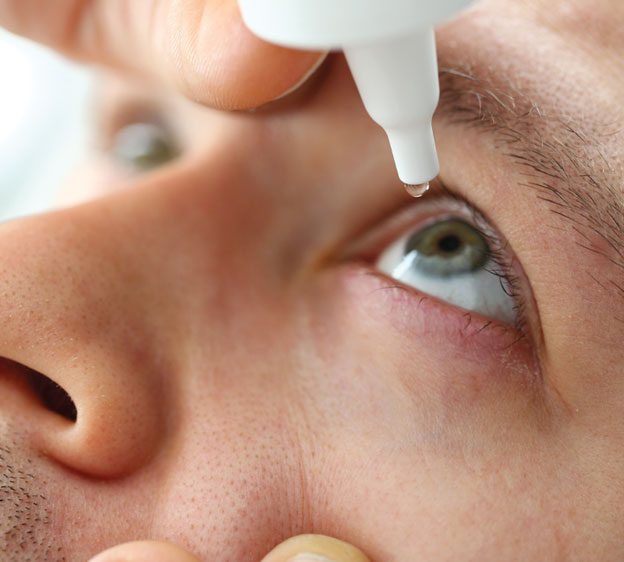
Few common conditions are more uncomfortable than pink eye, which is when the white part of the eye becomes pink or red and swollen. Also known as conjunctivitis, this condition can cause pain, itching and burning in one or both eyes. These symptoms usually clear up on their own within two weeks. Until they do, you can find relief using home remedies for pink eye.
Read More: Coming Down With the Crud?
What’s Your Type?
Knowing what type of pink eye you have can help you choose which home remedies to use. The main types of pink eye include:
- Viral pink eye (viral conjunctivitis). Viruses, including those that can cause a runny nose and other upper respiratory symptoms, are the most common cause of pink eye. Often, viral pink eye starts in one eye and spreads to the other, leading to watery eyes. This type of pink eye is contagious.
- Bacterial pink eye (bacterial conjunctivitis). Bacterial infections are another frequent cause of pink eye. Like viral pink eye, bacterial pink eye is highly contagious. Bacterial infections, however, cause pus in the eyes rather than clear, watery discharge.
- Allergic pink eye (allergic conjunctivitis). Allergies to pollen, pet dander or other irritants can affect your eyes, leading to pink eye in both. A (slight) silver lining: This type of pink eye is not contagious.
You may need to see a healthcare provider to identify what type of pink eye you have.
Read More: Help for Seasonal Allergies — All Year Long
Home Remedies for Pink Eye: Do’s and Don’ts to Help You Feel Better
“Whether you have viral, bacterial or allergic pink eye, soothing your eyes is important,” says Dr. Michael Kaup, a board-certified emergency medicine specialist at Beaufort Memorial Express Care. “You can use over-the-counter artificial tears to moisten your eyes and calm itching and burning. For bacterial or viral pink eye, place a warm compress over your eyes several times a day, but be sure to use a clean washcloth each time. Cool compresses are better for allergic pink eye.”
There’s more you can do to manage symptoms. Try these pink eye home remedies:
- Do take allergy medicine if you have allergic pink eye.
- Don’t wear contact lenses until pink eye runs its course.
- Do take over-the-counter medications, such as anti-inflammatories, to relieve pain due to viral or bacterial pink eye.
- Don’t wear eye makeup until your symptoms clear up.
Read More: Can Adults Develop New Allergies?
Stop the Spread
If you have viral or bacterial pink eye, doing your part to keep from spreading it to others — and not reinfecting yourself — is just as important as using home remedies to feel better. Here’s what you can do:
- Clean the area around your eyes at least twice daily.
- Clean your glasses often.
- Don’t let others borrow your makeup, glasses or other items that could spread bacteria or viruses to them.
- Don’t touch your eyes.
- Use new eye makeup, as well as contact lenses, solution and cases once the infection runs its course.
- Wash your hands frequently with soap and warm water to remove germs.
When Home Remedies for Pink Eye Need a Helping Hand
Pink eye usually clears on its own, but that’s not always the case. If your symptoms are severe or don’t improve after a few days, see an immediate care or primary care provider.
“If your eye is extremely red or painful, or you have changes to your vision, you should see a health care provider,” Dr. Kaup says. “They’ll examine your eye and ask about your symptoms to determine whether you have pink eye and, if so, what type. Pinpointing the cause of pink eye helps guide treatment. If it’s unclear whether the infection is viral or bacterial, your healthcare provider may need to take a sample of discharge from your eye to send for laboratory testing.”
Prescription medications usually aren’t necessary to treat viral pink eye. However, healthcare providers sometimes use antiviral medications to treat certain cases of pink eye, such as those caused by the herpes simplex or varicella-zoster viruses, according to the Centers for Disease Control and Prevention.
Antibiotics aren’t effective against viral pink eye, but they may be necessary to treat pink eye caused by bacteria. If your healthcare provider prescribes antibiotic eye drops, take them as recommended and finish the whole course.
Dealing with pink eye due to allergies? Avoid the allergen causing your symptoms and use over-the-counter allergy medications. If they don’t work, your healthcare provider may prescribe allergy eye drops that can help.
Need to see a physician for pink eye-like symptoms but don’t feel up to an office visit? Use BMH Care Anywhere to have a video visit with a board-certified urgent care provider without leaving your couch.

